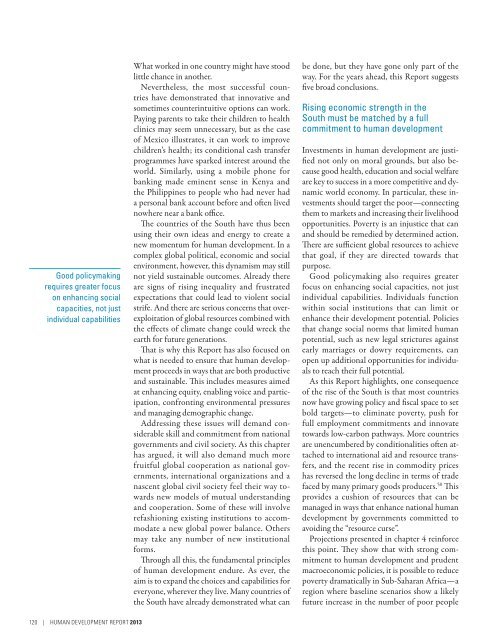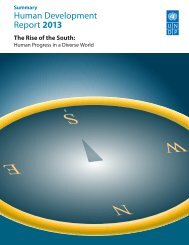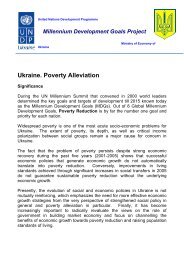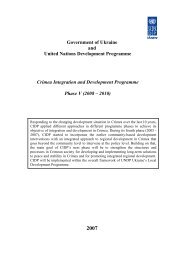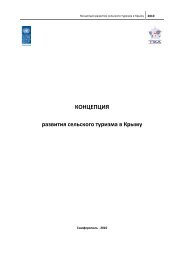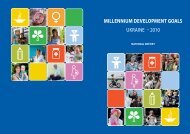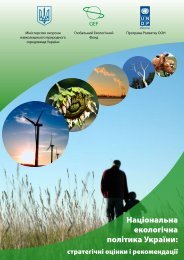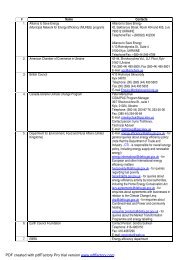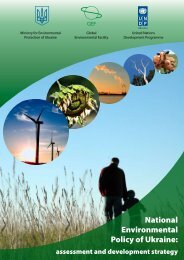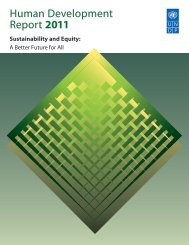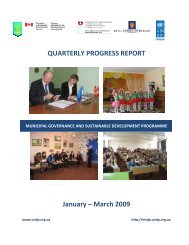E N S W - United Nations Development Programme
E N S W - United Nations Development Programme
E N S W - United Nations Development Programme
Create successful ePaper yourself
Turn your PDF publications into a flip-book with our unique Google optimized e-Paper software.
Good policymaking<br />
requires greater focus<br />
on enhancing social<br />
capacities, not just<br />
individual capabilities<br />
What worked in one country might have stood<br />
little chance in another.<br />
Nevertheless, the most successful countries<br />
have demonstrated that innovative and<br />
sometimes counterintuitive options can work.<br />
Paying parents to take their children to health<br />
clinics may seem unnecessary, but as the case<br />
of Mexico illustrates, it can work to improve<br />
children’s health; its conditional cash transfer<br />
programmes have sparked interest around the<br />
world. Similarly, using a mobile phone for<br />
banking made eminent sense in Kenya and<br />
the Philippines to people who had never had<br />
a personal bank account before and often lived<br />
nowhere near a bank office.<br />
The countries of the South have thus been<br />
using their own ideas and energy to create a<br />
new momentum for human development. In a<br />
complex global political, economic and social<br />
environment, however, this dynamism may still<br />
not yield sustainable outcomes. Already there<br />
are signs of rising inequality and frustrated<br />
expectations that could lead to violent social<br />
strife. And there are serious concerns that overexploitation<br />
of global resources combined with<br />
the effects of climate change could wreck the<br />
earth for future generations.<br />
That is why this Report has also focused on<br />
what is needed to ensure that human development<br />
proceeds in ways that are both productive<br />
and sustainable. This includes measures aimed<br />
at enhancing equity, enabling voice and participation,<br />
confronting environmental pressures<br />
and managing demographic change.<br />
Addressing these issues will demand considerable<br />
skill and commitment from national<br />
governments and civil society. As this chapter<br />
has argued, it will also demand much more<br />
fruitful global cooperation as national governments,<br />
international organizations and a<br />
nascent global civil society feel their way towards<br />
new models of mutual understanding<br />
and cooperation. Some of these will involve<br />
refashioning existing institutions to accommodate<br />
a new global power balance. Others<br />
may take any number of new institutional<br />
forms.<br />
Through all this, the fundamental principles<br />
of human development endure. As ever, the<br />
aim is to expand the choices and capabilities for<br />
everyone, wherever they live. Many countries of<br />
the South have already demonstrated what can<br />
be done, but they have gone only part of the<br />
way. For the years ahead, this Report suggests<br />
five broad conclusions.<br />
Rising economic strength in the<br />
South must be matched by a full<br />
commitment to human development<br />
Investments in human development are justified<br />
not only on moral grounds, but also because<br />
good health, education and social welfare<br />
are key to success in a more competitive and dynamic<br />
world economy. In particular, these investments<br />
should target the poor— connecting<br />
them to markets and increasing their livelihood<br />
opportunities. Poverty is an injustice that can<br />
and should be remedied by determined action.<br />
There are sufficient global resources to achieve<br />
that goal, if they are directed towards that<br />
purpose.<br />
Good policymaking also requires greater<br />
focus on enhancing social capacities, not just<br />
individual capabilities. Individuals function<br />
within social institutions that can limit or<br />
enhance their development potential. Policies<br />
that change social norms that limited human<br />
potential, such as new legal strictures against<br />
early marriages or dowry requirements, can<br />
open up additional opportunities for individuals<br />
to reach their full potential.<br />
As this Report highlights, one consequence<br />
of the rise of the South is that most countries<br />
now have growing policy and fiscal space to set<br />
bold targets—to eliminate poverty, push for<br />
full employment commitments and innovate<br />
towards low-carbon pathways. More countries<br />
are unencumbered by conditionalities often attached<br />
to international aid and resource transfers,<br />
and the recent rise in commodity prices<br />
has reversed the long decline in terms of trade<br />
faced by many primary goods producers. 50 This<br />
provides a cushion of resources that can be<br />
managed in ways that enhance national human<br />
development by governments committed to<br />
avoiding the “resource curse”.<br />
Projections presented in chapter 4 reinforce<br />
this point. They show that with strong commitment<br />
to human development and prudent<br />
macroeconomic policies, it is possible to reduce<br />
poverty dramatically in Sub-Saharan Africa—a<br />
region where baseline scenarios show a likely<br />
future increase in the number of poor people<br />
120 | HUMAN DevELOPMENT REPORT 2013


